The views expressed in our content reflect individual perspectives and do not represent the authoritative views of the Baha'i Faith.
As seen on the Huffington Post: Building ’Men of Strength’: A Response to Sexual Violence
As reports of the egregious acts of rape around the world continue to stream in, I pause to reflect on what this says about our collective humanity. The stories that have emerged the past few weeks seem to have disquieting similarities: They are extremely violent, there are often groups of men involved, and the person attacked has been publicly shamed, even, in some cases, to the point of death from the physical injuries inflicted.
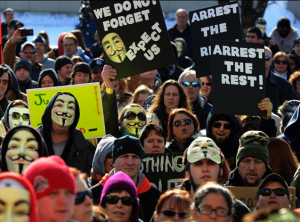
Steubenville Against Rape Rally (Toledo Blade)
Worsening the situation, we hear of victims being told they are to blame for what has happened to them. Whether it was the young woman raped and then carried like a sack in Steubenville or the young woman on the bus in India, or the hundreds of thousands of Congolese women who have also been raped in the last two decades, our capacity to hear, over and over, such stories and yet to remain hopeful for the social and moral progress of humanity is no easy task.
Amid such darkness, let’s explore a side of the discussion that is not often talked about: What has led us as a collective humanity to the place where a woman’s body (and in many cases a man’s body) can so commonly be used as an object on which to inflict violence, terror, and such savagery that even animals would not inflict upon each other? How do we as individuals see ourselves in relation to others, and are such attacks and the moral outrage that they have generated (expressed so extensively online and in our daily conversations) a sign that people around the world have been galvanized into a global outcry, or even a movement, to alter the acceptance of gender based violence?
The question of perception is also an important consideration. For if we see rape as affecting only the victim, we see only her (or his) physical trauma and fear, as terrible as it is, as the damage. However, if we see rape as an assault on our collective humanity, as a crime that creates continual fear and mistrust in the psyche of every man, woman or child, the perpetrators of the crimes in Steubenville and Delhi exert far greater influence than previously thought. They have the power to instill in each of us a deep sense of separateness, a fissure in the fabric of society.
But I would argue that they wield such power only if we allow them to. What would our conversations sound like if these individuals were always seen as a deviation from the norm rather than, as many have sadly come to believe, as representative of a majority of men in the world, constrained only by the fear of punishment? What if, instead, we turned our gaze to see men and boys as potential champions of the rights of women — allies in the building of a just, peaceful and tolerant society? We would have reclaimed a truth that a few individuals tried to steal away.
To explore further the idea of the way humanity is linked, I turn to the teachings of the Baha’i Faith. Among the central teachings of this faith is the principle of the oneness of humanity. The son of the Prophet founder of this Faith, Abdu’l-Baha, writes:
“[C]onsider the welfare of the community as one’s own. It means, in brief, to regard humanity as a single individual, and one’s own self as a member of that corporeal form, and to know of a certainty that if pain or injury afflicts any member of that body, it must inevitably result in suffering for all the rest.”
This perspective might seem a sharp contrast to what we see and experience in an overwhelmingly individualistic society. But if we stop to reflect on the ways in which global trends and events — whether economic, environmental or even simply on the level of human interactions — are demonstrating ever-increasing interconnectedness, we might be able to better understand the meaning of the quote and appreciate its implications.
In mid-January 2013, Men Can Stop Rape held a three day from-theory-to-practice training session in the nation’s capital. This organization, headquartered in Washington D.C., works to raise the consciousness of society around the positive role men can play in preventing rape. Early in the training, the participants were told that statistics overwhelming show that “most men don’t rape.”
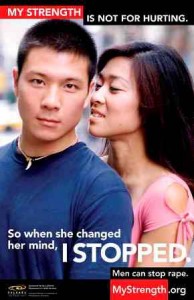 Most men don’t rape — a few simple words strung together, but a sentence that is not often repeated. It reminds us that the “big bad boogey monster around the corner mentality,” while very natural, given all the stories we are exposed to in the media, can be a misleading illusion. While it is so hard not to have such fear, especially as a young woman walking down a dark street at night, as I often feel, it is also imperative that we champion the work that organizations like Men Can Stop Rape and others do in shifting thoughts and behaviors.
Most men don’t rape — a few simple words strung together, but a sentence that is not often repeated. It reminds us that the “big bad boogey monster around the corner mentality,” while very natural, given all the stories we are exposed to in the media, can be a misleading illusion. While it is so hard not to have such fear, especially as a young woman walking down a dark street at night, as I often feel, it is also imperative that we champion the work that organizations like Men Can Stop Rape and others do in shifting thoughts and behaviors.
Particularly powerful is the work this organization does in high schools with their Men of Strength Clubs by helping boys and young men to discard harmful concepts of sexually exploitative “real men” and replace them with socially responsible concepts of “strong men” — men who see women as fully equal human beings worthy of their respect.
This work, which started as a small initiative, has spread to more than 100 schools and college campuses. A long road still needs to be traversed before it can claim to have changed the culture of a town or city, let alone the nation. Nevertheless, if work along this road is coupled with a sustained public outrage over sexual violence, the conditions will be ripe for the concepts and communication tools of Men Can Stop Rape to generate ever larger numbers of transformative conversations among boys and young men. Eventually, this will lead to a shift in male culture from one often supportive (or indifferent through inaction) of sexual violence to one overwhelmingly intolerant of it.


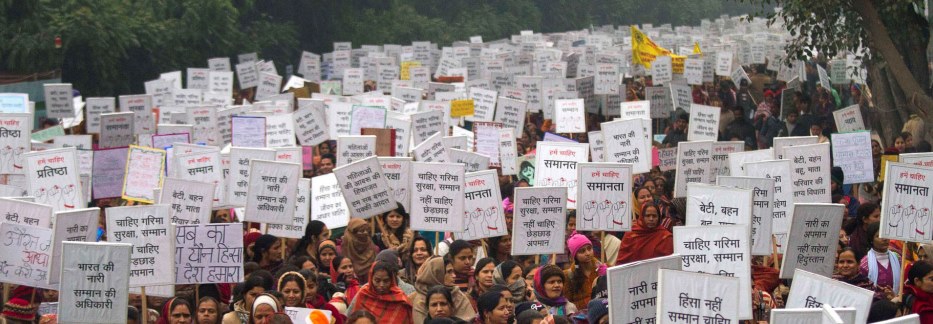

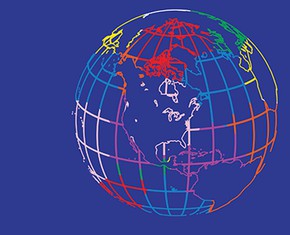
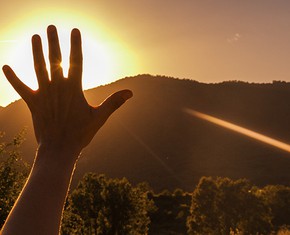
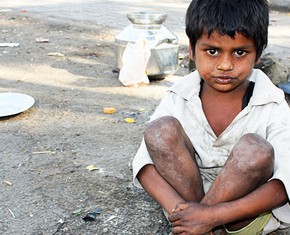









Comments
Sign in or create an account
Continue with Googleor